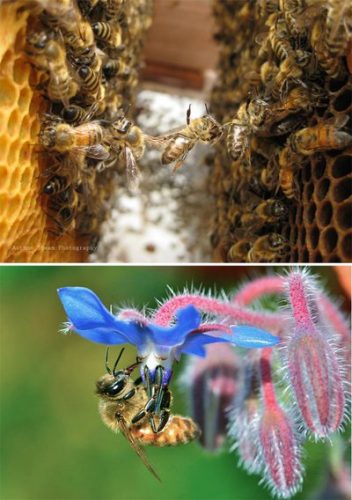
Bee advocates and pesticide foes have been slowly gaining traction in their fight against neonicotinoids, a class of insecticides that many believe is contributing to the dramatic declines in honeybee populations. Groups such as Eugene-based Oregon Sustainable Beekeepers (OSB) and Beyond Toxics have been fighting to have local businesses remove neonics from their shelves and, while they haven’t fully succeeded, they have persuaded some local businesses to distribute information about the toxics.
The argument against neonics was bolstered this summer after the Oregon Department of Agriculture called for a six-month moratorium on the use of dinotefuran, a type of neonic, after thousands of bees died when blooming linden trees were sprayed with the chemical in Wilsonville.
Phil Smith of OSB says that a major new study out of Italy “basically says neonics block immune system proteins in the bees.” He says it is “comparable to AIDS in humans when immune system is compromised.”
Beekeeper and OSB member Gary Rondeau says that he lost all of his bees over the winter, “and coming into spring it appeared that bee numbers were down all around town.” Rondeau says, “Despite the growing evidence against these chemicals, we face an uphill fight to get them banned.”
Locally, Eugene has stopped using neonicotinoids to maintain city plantings. Bee advocate and concerned citizen Mary Addams says businesses and governments that do the right thing should be rewarded. She praises Down to Earth, which does not carry neonics and is looking into “Carrotmob” campaigns where shoppers go spend money en masse at a business to reward it for improvements.
Addams says she was delighted when she went into Jerry’s Home Improvement last week and saw that while the store is still carrying neonics, the poisons are placed at the end of the aisle and are accompanied by a brochure explaining that neonics are “not bee safe.” The brochures provide information on the chemicals and links to information pages on neonics from OSB and Oregon State University. Addams says that another Oregon company, Bi-Mart, is going to begin supplying brochures as well.
Addams, who began working on the bee issue through her involvement with the Green Party, says people who do use the chemicals should read the labels, and they should know that toxics such as neonicotinoids can be dangerous “beyond what’s on the label.”
The above photos are by the winners of Beyond Toxics’ “Beauty of the Bees'”photo contest with over 70 entries. First place (top) Autumn Steam. Second place Catia Juliana.